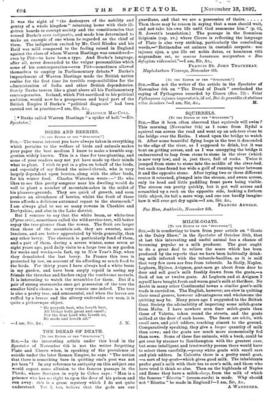THE DREAD OF DEATH.
[To THE EDITOR OF THE "SPECTATOR."] BIR,—In the interesting article under this head in the Spectatvr of November 6th is not the writer forgetting Plato and Cicero when, in speaking of the prevalence of suicide under the later Roman Empire, he says : "The notion that there is something base in quitting one's post was not yet born "? In any reference to antiquity on this subject one would expect some allusion to the famous passage in the Pbaado, where Socrates in reply to Cebes says : "Man is a prisoner who has no right to open the door of his prison and run away ; this is a great mystery which I do not quite understand. Yet I, too, believe that the gods are our
guardians, and that we are a possession of theirs
Then there may be reason in saying that a man should wait, and not take his own life until God summons him." (p. 62, B. Jowett's translation.) The passage in the Somnium Scipionis (cap. xv.) where Cicero is reflecting the language of Plato is also very striking, particularly the concluding words,—"Retinendus est animus in custodiii, corporis : nen injussn ejns, a quo ille est nobis datns, ex hominum vital migrandnm est, as munus hunianum assignatum a Deo d,ef ugisse videamini."—I am, Sir, &C.,
FRANCIS ST. JOHN THACKERAY. lifapledurham Vicarage, November 8th.
[TO THE EDITOR OP THZ "SPECTATOR."] SIR,—Has not the writer of the article in the Spectator of November 6th on "The Dread of Death" overlooked the saying of Pythagoras recorded by Cicero (Sen. 73) : Vaal Pythagoras injussu imperatoris, id est, Dei de prwsiclio et stations
vitae deced,ere ?—I am, Sir, Ike., M.






































 Previous page
Previous page